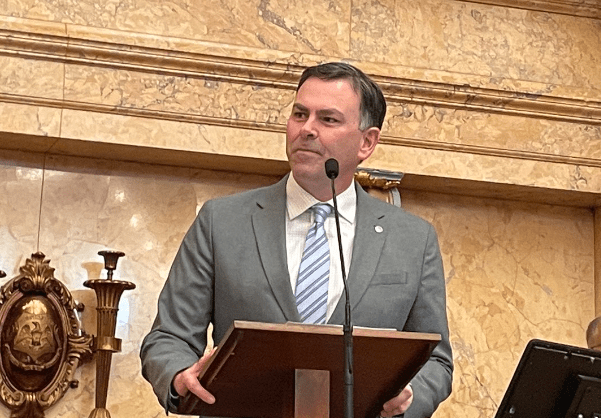This article first appeared on the Magnolia Tribune.


Secretary of State Michael Watson opens the 2024 session of the Mississippi House on January 2, 2024 (Photo: Sarah Ulmer/Magnolia Tribune)
Mississippi Secretary of State Michael Watson unveiled his 2024 legislative agenda on Wednesday, calling for campaign finance reforms and reducing business regulations, among other issues.
Mississippi Secretary of State Michael Watson met with members of the media Wednesday to discuss his plans for the next four years. During the meeting, Watson covered a number of hot topics, including campaign finance reform.
Secretary Watson wants to ensure campaign contributions are properly reported and can be easily searchable by the public. He said there are a lot of moving pieces to reach that goal, but it starts with establishing a state-funded searchable campaign finance system so the public can stay abreast of who is receiving money and from where. This could cost upwards of $2 million to achieve.
Watson also wants to bring enforcement of proper campaign finance filings into his office. He believes the Secretary of State’s office should have the authority to issue fines campaign finance violations. As he sees it, appeals would be handled outside the Secretary of State’s office by the Ethics Commission while collection of fines for violations would be the purview of the Attorney General. His intent is to strengthen the campaign finance laws and ensure violations are enforced.
“I would much rather have an elected official that’s responsible to the people directly as opposed to an appointed official,” Watson said. “I think it’s a good thing for sunshine, a good thing for transparency and for efficiency in the process.”
Another plan is to prevent contributions from one political action committee to another so there is a record of where campaign contributions are provided to avoid masking of the source.
As for contribution limits from corporations to candidates, Secretary Watson feels when the origin and amount of the contribution is public record, the public can make their own decisions.


Watson also touched on the debacle that occurred in Hinds County during the November General Election where some precincts did not have enough ballots. He said every county’s election commission received the same training. It was one of the things he started last year, ramping up training by going to each of the 82 counties in the state and providing a more hands-on experience.
“So, you’re going to see us ramp up even more than you have before… and hopefully that will help. Again, the issue in Hinds County that was kind of pointed to, ‘well, we had redistricting and we didn’t really know how to handle that,’ but other counties had redistricting as well and received the same training,” Watson elaborated.
He does not plan to seek changes to the voting, such as expanding early voting, saying he believes Mississippi has a good system in place.
Secretary Watson also wants lawmakers to continue unburdening would-be business owners and industry professionals. Mississippi’s regulatory environment can be a challenge to navigate due to a number of professions requiring licensing, such as barbering and cosmetology. Watson said his intent is to continue to cut those regulations and make it easier for businesses to operate in Mississippi. To that end, he wants to see the Occupational Licensure Review Board restructured, adding more state officials to the mix and removing the Attorney General since that office also represents the boards and commissions the OLRB monitors.
“One of the things I’m committed to do in the next four years is basically be a regulatory wrecking ball,” Watson said. “I think it’s important for Mississippi small business owners, those who have started careers, to be someone to advocate for that.”
In addition, Watson also addressed a recent Mississippi Supreme Court tidelands ruling that sided with Long Beach Harbor Resort, LLC. The battle, which lasted several years, focused on developer Jim Parrish’s intent to build a parking lot for his planned casino along with a 300-room hotel on land the developer leased from the Long Beach Port of Commission. To ensure those disputes are less likely, Watson intends to make tidelands language clearer. He said there was a time when someone could look at a map and challenge a piece of land’s designation, but Watson said that time has passed.
This article first appeared on the Magnolia Tribune and is republished here under a Creative Commons license.
Read original article by clicking here.

